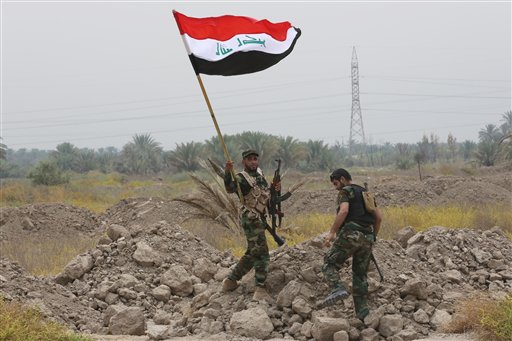BAGHDAD (AP) — Skirmishes broke out Tuesday between Iraqi security forces and militants on the outskirts of Tikrit, a local official and a resident said, a day after the Iraqi and Kurdish troops backed by U.S. airstrikes dislodged Islamic militants from a strategic dam in the country’s north.
The United Nations refugee agency, meanwhile, said it is launching one of its largest aid pushes aimed at helping close to a half million people who have been forced to flee their homes by the violence in Iraq.
The clashes in Tikrit, some 130 kilometers (80 miles) north of Baghdad, began on the militant-held city’s southwestern outskirts when a military convoy was travelling along the main highway that links Baghdad with the northern provinces, they said. The Iraqi military shelled militant positions inside and outside the city.
There were no immediate reports of casualties. The local official and resident both spoke on condition of anonymity, fearing for their safety.
Sunni extremists from the Islamic State group have occupied Tikrit and the northern city of Mosul since early June, as well as large parts of the country’s north and west. The militant onslaught has plunged Iraq into its worst crisis since the withdrawal of U.S. troops in 2011.
The group since has declared a self-styled caliphate in territory it controls in Iraq and neighboring Syria, imposing their own harsh interpretation of Islamic law.
The Iraqi military launched an operation in late June to try to wrest back control of Tikrit, but that quickly stalled after making little headway. Sporadic clashes have been reported around the city and surrounding areas since then, but efforts by Iraqi government forces and allied Sunni tribal militiamen have failed to push out the militants.
Earlier this month, the tomb of former Iraqi dictator Saddam Hussein just south of Tikrit was damaged in clashes between security forces and the radical group.
Iraqi army spokesman, Lt. Gen. Qassim al-Moussawi, said Tuesday that a “slow and gradual” push to retake areas around Tikrit is underway, an effort he described as “biting back the land.” Al-Moussawi said security forces dismantled more than 40 bombs in the area.
“There are still a lot of challenges and difficulties ahead of us,” he said in a live briefing aired on state TV. “The war needs time, but we are determined to annihilate the Islamic State (group) and to liberate all the areas they occupy — even if we suffer heavy causalities, because we have no other choice.”
On Monday, Iraqi and Kurdish forces recaptured the Mosul Dam in northern Iraq less than two weeks after it was seized by the militants. The dam is the largest in Iraq and a vital power and water resource for the country.
The gains made by the militants brought U.S. forces back into the conflict for the first time since they withdrew in 2011. America’s renewed involvement on the battlefield was a reflection of the growing international concern over the Sunni extremist group. Washington began carrying out dozens of airstrikes on Aug. 8.
Hours after retaking the dam, U.S. President Barack Obama called the development a “major step forward” in the fight against the group.
Obama said a breach of the dam could have had catastrophic consequences and endangered U.S. Embassy personnel in Baghdad. He said the U.S. was urgently providing arms and assistance to Iraqi security forces as well as Kurdish fighters fighting the extremists.
“We’ve got a national security interest in making sure our people are protected and in making sure that a savage group that seems willing to slaughter people for no rhyme or reason other than they have not kowtowed — that a group like that is contained, because ultimately it can pose a threat to us,” Obama told reporters.
Al-Moussawi on Tuesday hailed the “big success and achievement” of security forces, reiterating that the dam “is now under security forces’ full control.”
Also Tuesday, Iraq’s designate-Prime Minister Haider al-Abadi issued a statement praising security forces as “heroes” for confronting “the terrorist gangs.” He also called on security forces to ensure “precise targeting” so as not to hit the civilians.
Some 1.5 million people have been displaced by fighting in Iraq since the Islamic State’s rapid advance began in June, and thousands more have died. The scale of the humanitarian crisis prompted the U.N. to declare its highest level of emergency last week.
On Tuesday, the U.N. refugee agency announced that it will begin a massive air, road and sea operation Wednesday, starting with a four day airlift using Boeing 747s from Aqaba in Jordan to Iraq’s northern Kurdish region.
“Many are still coming to grips with the tragedy they’ve been through in recent weeks – fleeing homes with nothing, and many trying to cope with the loss of loved ones,” Adrian Edwards, a spokesman for UNHCR, said in a statement. “Emergency support is an urgent need that we are trying to meet.”
—
Associated Press reporter Bram Janssen in Irbil, Iraq contributed to this report.

COMMENTS
Please let us know if you're having issues with commenting.